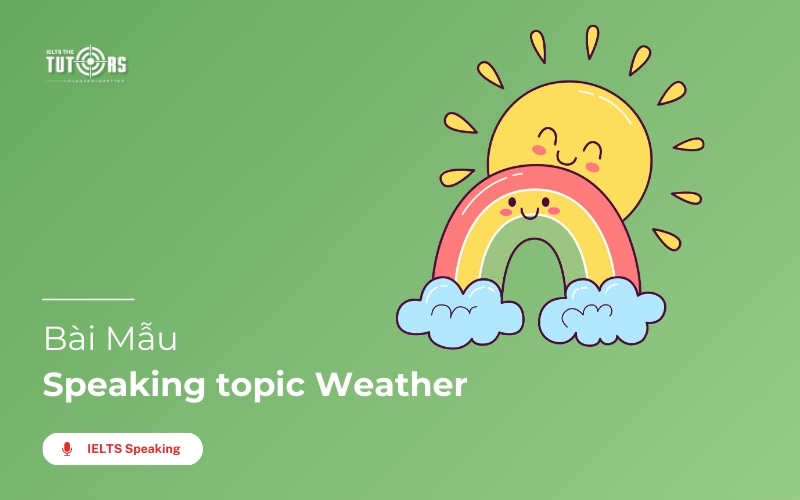
Thời tiết là một chủ đề thú vị và gần gũi trong đời sống và thường xuyên xuất hiện trong các kỳ thi như IELTS. Mặc dù chủ đề này không quá khó, nhưng bạn vẫn nên chuẩn bị thật kỹ lưỡng từ ý tưởng cũng như vốn từ vựng phải thật chắc.
Trong bài viết này, IELTS The Tutors sẽ hướng dẫn bạn các bài mẫu và chủ điểm từ vựng về topic weather IELTS Speaking Part 1, 2, 3 giúp bạn phát triển câu trả lời một cách tự nhiên và ấn tượng, từ đó chinh phục điểm số cao trong kỳ thi.
| Key takeaways |
Part 1
Part 2
Part 3
Từ vựng
|
Bài mẫu topic weather IELTS Speaking Part 1
Topic weather IELTS Speaking Part 1 thường xuất hiện ở các câu hỏi khởi động, nơi giám khảo kiểm tra khả năng nói tự nhiên của thí sinh về những điều quen thuộc trong cuộc sống, như thời tiết nơi bạn sống, thời tiết yêu thích, hay cách thời tiết ảnh hưởng đến bạn.
Question 1: What is the weather like in your hometown?
In my hometown, the weather is relatively mild throughout the year, with distinct seasonal changes. Summers are warm but not scorching, typically hovering around 30 degrees Celsius, while winters can be chilly but rarely dip below 10 degrees. Spring and autumn are particularly pleasant, with crisp air and plenty of sunshine, making outdoor activities very enjoyable.
Vocabulary:
- Mild (adj): ôn hòa, dễ chịu
- Seasonal changes (noun phrase): sự thay đổi theo mùa
- Scorching (adj): nóng như thiêu đốt
- Hover around (verb): dao động quanh mức
- Chilly (adj): lạnh se se
- Crisp air (noun phrase): không khí trong lành và se lạnh
Question 2: Which season do you like the most?
I’m particularly fond of spring because everything feels so fresh and rejuvenating. The flowers are in full bloom, and the air smells delightful. It’s the perfect time for outdoor activities like picnics or jogging. Plus, the temperatures are neither too hot nor too cold, which is ideal for me.
Vocabulary:
- Fond of (adj): thích
- Rejuvenating (adj): làm tươi mới, trẻ hóa
- In full bloom (phrase): nở rộ
- Delightful (adj): dễ chịu, thú vị
- Neither too hot nor too cold (phrase): không quá nóng cũng không quá lạnh
Question 3: Do you prefer hot or cold weather?
Personally, I would say I prefer cold weather because it’s easier to layer up and stay cozy. I enjoy sipping a warm cup of tea or reading a book by the fireplace during winter. On the other hand, hot weather can be exhausting, especially when the humidity is high, and you feel sticky all day.
Vocabulary:
- Layer up (verb phrase): mặc nhiều lớp quần áo
- Cozy (adj): ấm áp, thoải mái
- Sticky (adj): dính, ẩm ướt
- Exhausting (adj): mệt mỏi, kiệt sức
- Humidity (noun): độ ẩm
Question 4: Does the weather affect your mood?
Absolutely. I often find myself feeling more energized and optimistic on sunny days, as the warm sunlight lifts my spirits. However, gloomy or overcast weather can make me feel a bit lethargic. That being said, I do enjoy the occasional rainy day as it gives me an excuse to stay indoors and relax.
Vocabulary:
- Energized (adj): tràn đầy năng lượng
- Optimistic (adj): lạc quan
- Lethargic (adj): mệt mỏi, thiếu sức sống
- Overcast (adj): u ám
- Occasional (adj): thỉnh thoảng
Question 5: Have you ever experienced extreme weather conditions?
Yes, I remember experiencing a severe tropical storm a few years ago. The heavy rainfall and strong winds caused significant disruptions, including power outages and flooded streets. It was both frightening and eye-opening, as it made me realize how vulnerable we are to nature’s unpredictability.
Vocabulary:
- Tropical storm (noun): bão nhiệt đới
- Heavy rainfall (noun phrase): mưa lớn
- Strong winds (noun phrase): gió mạnh
- Power outage (noun phrase): mất điện
- Flooded streets (noun phrase): đường ngập lụt
- Frightening (adj): đáng sợ
- Eye-opening (adj): mở mang tầm mắt
- Vulnerable (adj): dễ bị tổn thương
- Unpredictability (noun): sự khó đoán
Xem thêm:
Bài mẫu topic weather IELTS Speaking Part 2
Question 1: Describe your favorite weather.
You should say:
- What it is
- When this weather usually occurs
- What you like to do in this weather
And explain why you like it.
I’m going to talk about my favorite weather, which is the crisp, cool, and sunny weather of early autumn.
In my country, this weather usually occurs during late September and early October, right after the summer heat subsides and before the chilly winter sets in. The temperature during this time is just perfect—neither too hot nor too cold, usually around 20 degrees Celsius. The air feels fresh and invigorating, and the skies are often clear with golden sunlight streaming down.
When this weather comes around, I enjoy spending time outdoors. I usually go for long walks in the park or take short trips to nearby scenic places. It’s also the perfect time to have a picnic with family or friends because the weather is comfortable enough to stay outside for hours. I also enjoy sitting by the window with a cup of tea, reading a book, and soaking in the peaceful ambiance.
The reason I love this weather so much is that it fills me with positive energy. The gentle breeze and the warmth of the sun seem to lift my mood instantly. Moreover, the natural beauty of autumn, with its colorful leaves and golden light, makes everything feel magical. It’s a time when I feel truly relaxed and connected to nature.
Vocabulary:
- Crisp (adj): mát mẻ và trong lành
- Subside (verb): giảm bớt, lắng xuống
- Chilly (adj): lạnh se se
- Invigorating (adj): làm cho sảng khoái, tràn đầy năng lượng
- Golden sunlight (noun phrase): ánh nắng vàng rực
- Scenic (adj): có phong cảnh đẹp
- Ambiance (noun): không khí, cảm giác môi trường xung quanh
- Gentle breeze (noun phrase): cơn gió nhẹ
- Lift one’s mood (verb phrase): làm tâm trạng vui vẻ hơn
- Colorful leaves (noun phrase): lá cây đầy màu sắc
- Connected to nature (adj phrase): gắn kết với thiên nhiên
Question 2: Describe a time when you experienced extreme weather.
You should say:
- What the weather was like
- Where you were
- What you did during that time
And explain how you felt about it.
I’d like to share an unforgettable experience I had with extreme weather during a tropical storm that hit my city a few years ago.
It happened in the summer of 2020, during the monsoon season. The weather forecast had warned of heavy rainfall and strong winds, but no one expected the storm to be as intense as it turned out to be. On the day of the storm, the sky turned dark even though it was midday, and the wind howled relentlessly. Rain poured down in sheets, flooding streets within hours.
At the time, I was at home with my family, and we had to take several precautions to stay safe. We secured the windows and doors with extra locks and moved valuable items to higher shelves in case of flooding. Unfortunately, the power went out, leaving us in complete darkness except for the dim light of candles. Despite the frightening conditions, we managed to keep calm and support each other.
What struck me most about this experience was how unpredictable and powerful nature can be. The storm left the city paralyzed for a few days, but it also brought people together. Neighbors helped each other to clean up the mess and shared food and supplies. Although it was a challenging time, it gave me a deeper appreciation for resilience and community spirit.
Vocabulary:
- Tropical storm (noun): bão nhiệt đới
- Monsoon season (noun phrase): mùa mưa
- Heavy rainfall (noun phrase): mưa lớn
- Strong winds (noun phrase): gió mạnh
- Howl (verb): hú, rít (dùng cho tiếng gió)
- Pour down in sheets (verb phrase): mưa xối xả
- Flooded streets (noun phrase): đường phố ngập lụt
- Precautions (noun): các biện pháp phòng ngừa
- Secure (verb): gia cố, bảo vệ
- Power outage (noun phrase): mất điện
- Dim light (noun phrase): ánh sáng mờ nhạt
- Frightening (adj): đáng sợ
- Unpredictable (adj): khó lường
- Resilience (noun): sự kiên cường
- Community spirit (noun phrase): tinh thần cộng đồng
Bài mẫu topic weather IELTS Speaking Part 3
Question 1: How do weather patterns affect people’s lives?
Weather patterns have a significant impact on people’s daily lives and activities. For instance, extreme weather conditions like storms or heat waves can disrupt transportation, affect health, and even damage property. On a more positive note, pleasant weather can encourage outdoor activities and social interactions, contributing to better physical and mental health.
Vocabulary:
- Weather patterns (n): mô hình thời tiết
- Extreme weather conditions (n): điều kiện thời tiết khắc nghiệt
- Disrupt transportation (v): làm gián đoạn giao thông
- Pleasant weather (n): thời tiết dễ chịu
- Social interactions (n): sự giao tiếp xã hội
- Physical and mental health (n): sức khỏe thể chất và tinh thần
Question 2: Do you think climate change is affecting the weather?
Yes, climate change is definitely affecting the weather. We are witnessing more frequent and intense weather events, such as hurricanes, droughts, and floods. These changes are causing disruptions in agriculture, increasing the risk of natural disasters, and impacting ecosystems. It’s crucial that we take action to mitigate the effects of climate change to ensure a stable and predictable climate for future generations.
Vocabulary:
- Climate change (n): biến đổi khí hậu
- Frequent and intense weather events (n): hiện tượng thời tiết thường xuyên và dữ dội
- Droughts (n): hạn hán
- Floods (n): lũ lụt
- Natural disasters (n): thiên tai
- Mitigate the effects (v): giảm thiểu tác động
- Stable and predictable climate (n): khí hậu ổn định và có thể dự đoán được
Question 3: How important is it for people to be aware of the weather forecast?
Being aware of the weather forecast is very important for planning daily activities and ensuring safety. For example, knowing about an upcoming storm allows people to prepare and avoid unnecessary travel. Additionally, farmers rely on weather forecasts to make decisions about planting and harvesting crops. Staying informed about the weather helps people make better decisions and avoid potential risks.
Vocabulary:
- Weather forecast (n): dự báo thời tiết
- Ensure safety (v): đảm bảo an toàn
- Upcoming storm (n): cơn bão sắp tới
- Avoid unnecessary travel (v): tránh đi lại không cần thiết
- Planting and harvesting crops (n): trồng và thu hoạch mùa màng
- Potential risks (n): rủi ro tiềm tàng
Từ vựng ăn điểm trong topic weather IELTS Speaking
Bạn không thể hoàn thành tốt bài thi IELTS Speaking topic weather nếu như không có sự chuẩn bị kỹ về vốn từ vựng. Dưới đây là một số từ vựng tiêu biểu về chủ đề này có thể giúp bạn trình bày hiệu quả hơn với giám khảo:
Từ vựng về tình trạng thời tiết
|
Từ vựng |
Phiên âm |
Loại từ |
Ý nghĩa |
|
Sunny |
/ˈsʌn.i/ |
Adj |
Nắng |
|
Cloudy |
/ˈklaʊ.di/ |
Adj |
Có mây |
|
Rainy |
/ˈreɪ.ni/ |
Adj |
Có mưa |
|
Stormy |
/ˈstɔːr.mi/ |
Adj |
Có bão |
|
Foggy |
/ˈfɒɡ.i/ |
Adj |
Có sương mù |
|
Windy |
/ˈwɪn.di/ |
Adj |
Có gió |
|
Humid |
/ˈhjuː.mɪd/ |
Adj |
Ẩm ướt |
|
Overcast |
/ˈəʊ.və.kɑːst/ |
Adj |
U ám |
|
Drizzle |
/ˈdrɪz.əl/ |
Noun/ Verb |
Mưa phùn |
|
Torrential rain |
/təˈren.ʃl reɪn/ |
N phrase |
Mưa như trút nước |
|
Thunderstorm |
/ˈθʌn.dɚˌstɔːrm/ |
Noun |
Bão có sấm sét |
|
Hail |
/heɪl/ |
Noun/ Verb |
Mưa đá |
|
Blizzard |
/ˈblɪz.ɚd/ |
Noun |
Bão tuyết |
|
Heatwave |
/ˈhiːt.weɪv/ |
Noun |
Đợt nắng nóng |
|
Cyclone |
/ˈsaɪ.kloʊn/ |
Noun |
Lốc xoáy |
|
Drought |
/draʊt/ |
Noun |
Hạn hán |
Xem thêm: IELTS Speaking Vocabulary: Tổng hợp từ vựng theo 16 chủ đề
Từ vựng thời tiết theo nhiệt độ
|
Từ vựng |
Phiên âm |
Loại từ |
Ý nghĩa |
|
Warm |
/wɔːrm/ |
Adj |
Ấm áp |
|
Hot |
/hɒt/ |
Adj |
Nóng |
|
Boiling |
/ˈbɔɪ.lɪŋ/ |
Adj |
Nóng như thiêu đốt |
|
Mild |
/maɪld/ |
Adj |
Ấm nhẹ |
|
Cool |
/kuːl/ |
Adj |
Mát |
|
Cold |
/koʊld/ |
Adj |
Lạnh |
|
Freezing |
/ˈfriː.zɪŋ/ |
Adj |
Đóng băng, cực lạnh |
|
Chilly |
/ˈtʃɪl.i/ |
Adj |
Lạnh giá, se lạnh |
|
Bitterly cold |
/ˈbɪt.ɚ.li koʊld/ |
Phrase |
Lạnh buốt |
|
Scorching |
/ˈskɔːr.tʃɪŋ/ |
Adj |
Nóng như thiêu đốt |
|
Sweltering |
/ˈswel.tər.ɪŋ/ |
Adj |
Nóng nực |
|
Arctic |
/ˈɑːrk.tɪk/ |
Adj |
Rất lạnh, lạnh giá như Bắc Cực |
|
Crisp |
/krɪsp/ |
Adj |
Lạnh khô và dễ chịu |
|
Frosty |
/ˈfrɔː.sti/ |
Adj |
Giá lạnh, có sương giá |
Hy vọng rằng bài viết trên đã cung cấp cho bạn đầy đủ kiến thức về topic Weather IELTS Speaking bao gồm bài mẫu và từ vựng nên học. Hãy luyện tập thường xuyên để đạt kết quả tốt trong kỳ thi IELTS nhé. Bên cạnh đó, hãy luyện tập phát âm thật tốt để có thể gây ấn tượng với giám khảo, bạn cũng có thể tham khảo khóa học IELTS Foundation của IELTS The Tutors để cải thiện khả năng Speaking của bạn nhé!












